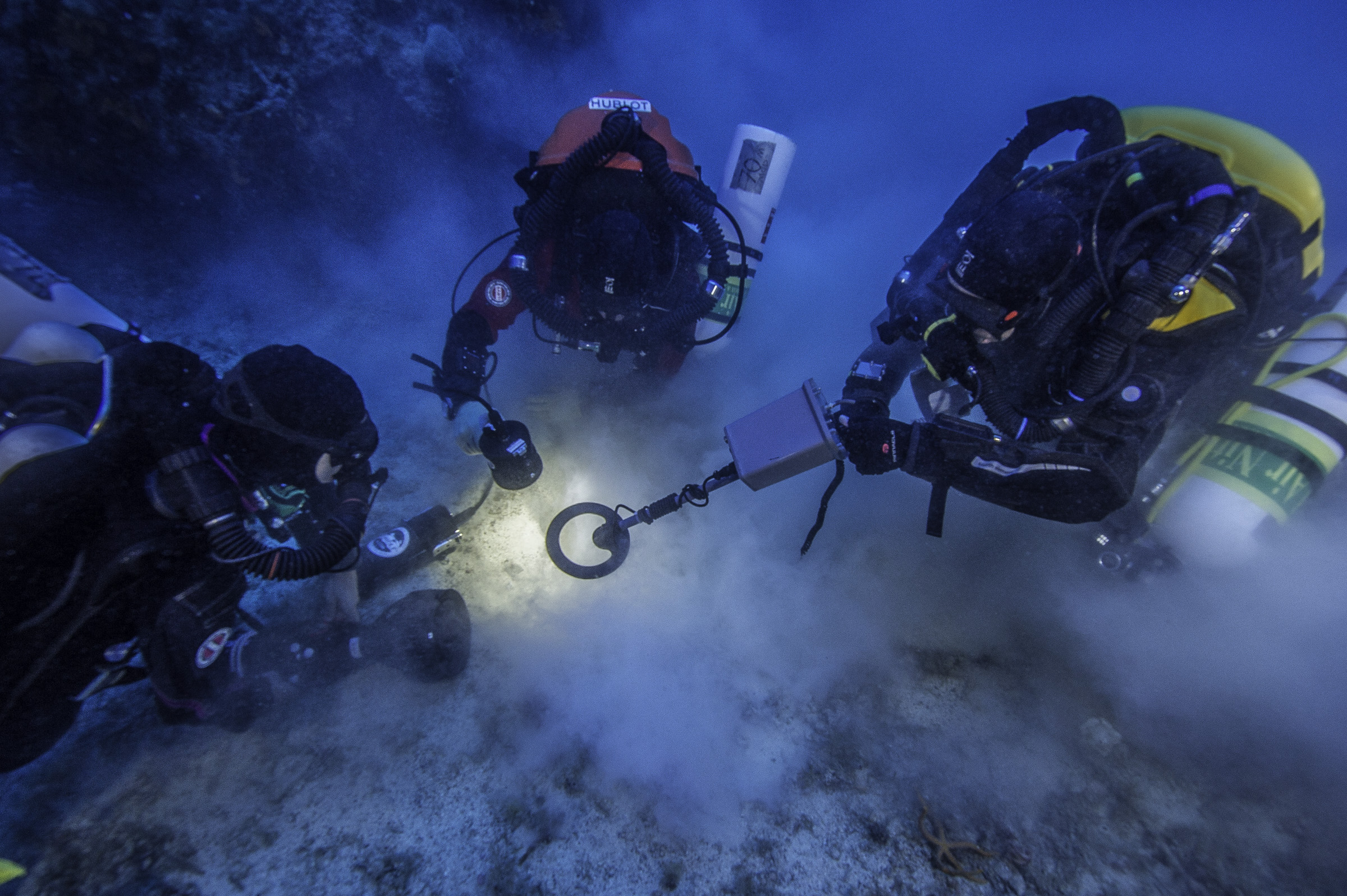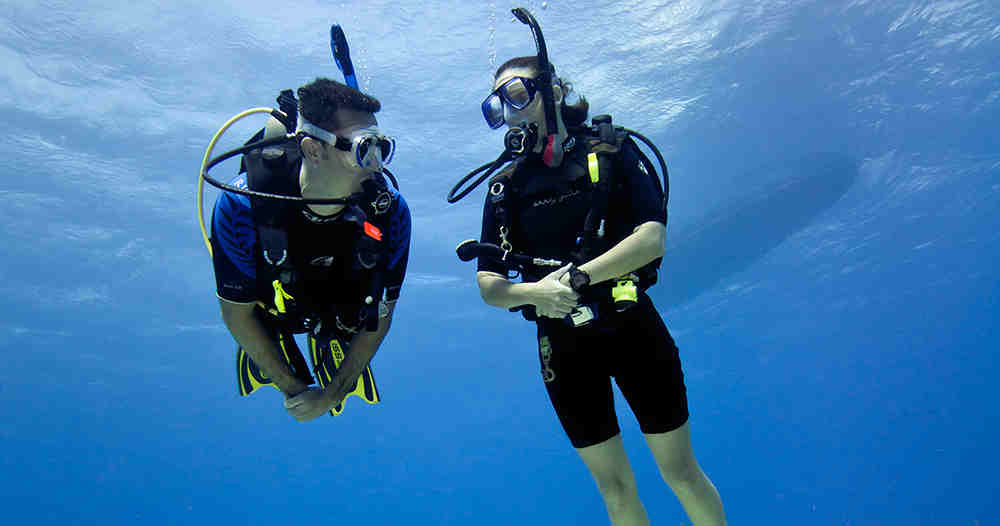*This post may contain affiliate links. As an Amazon Associate we earn from qualifying purchases.
Buddies – they’re the most important thing to bring along when you dive, right? Well, yes, but it’s not as simple as a positive/negative split. Here’s what you should know about the benefits and flaws of each part of the buddy system.
Logistical Considerations
Experienced divers know that patience and relaxation are the keys to a successful dive… and those can be in short supply among people going down for the first time. Let’s not forget that diving consists of strapping a can of condensed air to your back and diving deeper than humans can normally tolerate with the hope the pressure won’t crumple your gear like a used soda can.
I mean, there’s absolutely nothing to worry about, right?
Seriously, though, it helps to have an extra pair of hands at every step of the dive, starting with suiting up to go underwater. While most experienced divers can easily do things themselves, newcomers often need a hand getting things adjusted, tightened, and connected properly. You don’t want a leak in your air hose, after all, or you might become a floating person underwater in the worst possible way.
Like any potentially dangerous experience, it helps to have an expert along until you get used to things. Incidentally, this is why you should avoid buddying up with someone of the same level of experience as you. It’s best to have one person be the ‘lead’ and give instructions while the other follows along and learns.
If that’s not possible, you should try to have at least one experienced diver for every three amateurs. This is within the range most experts can handle without the burden of trying to keep an eye on the entire big group.

Safety Considerations
The buddy system started at a time when scuba equipment wasn’t as reliable as it is now. The truth is that despite all of the horror stories, modern diving equipment is extremely predictable and reliable as long as it’s properly maintained. Nothing is truly foolproof, but most diving equipment is as close as it gets.
The problem, of course, is that most divers can’t carry much in the way of redundancy. A single-cylinder setup has no backup in cases where it free-flows under the surface or the regulator fails outright, and at that point, a diver needs to rely on their buddy.
Scenarios like this are one of the main reasons the buddy system is still in force despite the overall improvements in safety. Damage from normal use isn’t the only threat to be aware of, either. There’s always the chance that aquatic life and hazards – ranging from coral and rocks to sharks and debris – could damage your diving equipment.
The good news is that external, human-made hazards are fairly rare below the surface. As long as you’re paying proper attention to your surroundings, chances are you’ll be able to see threats coming well in advance.
Fun Considerations
Diving is fun – but it’s not quite as fun if you’re doing it all by yourself. Sharing the experience turns it into something more, and it’s hard to adequately describe what it’s like if you haven’t been there.
This is, quite frankly, the reason most people take up diving in the first place. A few people learn it for scientific or medical reasons, but as far as recreational diving goes, people do it almost exclusively for the joy of a good dive.
Aside from all of that, humans are naturally social. Quite frankly, we like being with other people at least some of the time, and it makes up a significant part of our behavior. When diving with a buddy, you’ll be in constant communication, using hand signals to dictate everything from where to go to how your equipment is doing. It’s not quite like talking, but you will feel connected when diving with a buddy.

Diving With A New Buddy
In most cases, you won’t have any problems when you’re diving with a buddy you’ve been with before. A new buddy is something else entirely. If you’re diving with a friend on your own time, you probably know how experienced they are and what to expect. If you’re diving with someone as part of a tour group of gathering, you may have vastly different skills and ideas about what’s appropriate.
This can turn a fun dive into a stress-inducing headache. For example, you may find yourself diving with someone who constantly signals to end the dive and surface, or swims off to take photographs of whatever’s caught their interest.
It’s hard to tell ahead of time if you’re going to be paired with someone whose style frustrates you. The best thing you can do with a new buddy is talk with them about their diving experience and what they plan to do while they’re underwater. This can turn otherwise frustrating behavior into an interesting and exciting change for your normal routine.
To go with an earlier example, you might decide to act as a spotter for a photographer buddy and try to help them find the most interesting sights. That way, instead of watching them swim off on their own all the time, you know that they’ll constantly be looking to you for guidance on where to go next. That puts you back in control of the dive.
Remember, test each other on your knowledge of diving signals. Chances are they’re not going to forget OK or End Dive, but new dive buddies may be less familiar with Low On Air, Danger, and Which Direction. It’s too late to discuss things once you’re underwater, so making sure you know all common signals beforehand is vital to a safe dive.
Variation: Three-Person Groups
In many cases, three really is better than two, especially if you all have similar levels of experience. In a trio, you can conduct votes on various matters to make decisions. This removes each member from the position of having to be in charge all the time while simultaneously adding an extra pair of eyes to look out for danger.
Regardless of group size, someone should be familiar with your dive boat and know how to get in and out of it. Some boats have quirks, and if you need to return rapidly, it’s better to have someone who knows what those quirks are.

Is It Worth Becoming The Leader?
If you’re on a dive for fun, you may not want to spend the whole trip babysitting new scuba divers and making sure they don’t do anything dangerous. In fact, avoiding this is why many divers prefer to stick with people around their skill level instead of making sure every newcomer has an experienced guide. This is especially true if you’re not getting paid to do the teaching.
Similarly, it can be intimidating to be the less-experienced member of a group. You may feel like you’re slowing your buddy down, embarrassing them in front of the group, or pushing them outside of their comfort zone.
In the end, only you can decide if it’s worth becoming a leader (or follower) instead of part of an equal pair of divers. Some people enjoy teaching; others don’t. Either way, don’t be afraid to speak up. If you have to be part of an unequal pair, follow the one simple rule: The leader is in charge.
That seems like it should be obvious, but many new divers don’t realize how much control they’re giving up by putting the leader in complete charge of the dive. That means only one member of the group gets to decide when you swim, where you go, what you see, and how long you can spend on activities like taking pictures or videos.
The only exceptions to this are safety matters, like needing to share a tank or end the dive. Anyone can end the dive at any time and for any reason. Whether you’re the leader or the follower, you do not question or try to overrule this in the middle of a dive. You can discuss (and perhaps disagree) about it once you’re safely on the surface again, but End Dive is not an optional signal.

Can I Ever Go Diving By Myself?
Yes, but it’s not recommended to go solo diving unless you’re sticking to the shallows and regularly returning to the surface for air. The Buddy System in diving isn’t perfect – you can get frustrated, be matched with someone who seems to do everything wrong and spend more time telling people what to do than enjoying a leisurely dive through the area.
However, it’s still better than the alternative. Whether it’s making sure all of your gear is on correctly, having a backup in case something breaks, or just having fun on your trip, buddies are more helpful than not when diving.

